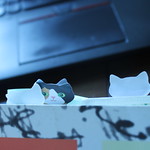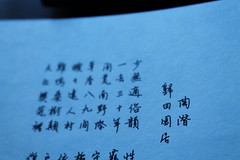Brenda Shaughnessy, The Octopus Museum, Knopf, 2019
I had hopes that this book would actually be about what it says on the tin: octopuses, different ones, in some sort of zoo or educational setting. But I also knew that I never get that sort of thing, that isn’t what other people write, a catalogue of octopuses, so I tempered my expectations, squashed them—
So I was very surprised to find that the table of contents for the book is titled Visitor’s Guide to the OM Exhibits and that it was explained how many “exhibitions spaces” the museum has (book sections) and that the sections of the book were titled phrases which contained “collection” or “gallery” or which sounded like art exhibit titles.
There is a prologue poem before the first exhibit—I am sure there is some museum analogue—called “Identity & Community (There is No ‘I’ in ‘Sea’)” and when I looked at it, I just told myself: read it like prose. Ignore the lines, the line breaks, just keep the sound going. This was a struggle but I did my best. An essay, a sort of monologue. Ignore the white space. It has no meaning. Squashed.
But I really identified with that first line, so much about an introvert’s desires. I was taken with the narrative voice, the choppy sentences, the little quirks of grammar. But to be honest, I have spent so much time telling myself to remember things by writing them down that the final verse-paragraph was a kick in the gut. I knew that feeling intimately.
What I didn’t know at the time was how skillfully Shaughnessy was using the background scene in this poem to set up the remainder of the book.
The poems in The Octopus Museum are about self, they feel confessional, they are political, they come at today’s concerns from an oblique angle—and they have a consistent narrator who actually has a narrative to share with us. Formally, they scrawl across the page, sentences and paragraphs, but they teem with anaphora and alliteration. Structurally we are reading to travel through the museum and the pieces of art are confessional poems that build up a narrative. Sometimes what carried me through the book is the poetic device and sometimes it is the world-building as it turns into action.
The ocean is in each poem, part of the narrator’s story, sometimes scenery, sometimes metaphor, but we do not have its implications clearly hinted at until page 14: the fourth poem begins “Before”, many of its sentences and verse-paragraphs begin “before”. It is not until the final verse-paragraph of the first section that it becomes a proper noun, a delineation of time.
In the penultimate section of the fourth poem, we meet the Cephalopod Octopoid Overlords and it becomes “clear that they were taking over.” The poem continues on, to make clear that this is not metaphor—not only metaphor—and then it becomes clearest that we—humanity—are the subjects in a museum for octopuses.
The remainder of the poem exhibits discuss the current world and the old, situation the speaker in it and the speaker’s everyday concerns, but also commenting on what threatens you and I today, such as the poem titled “Are Women People?”
Shaughnessy’s poems are science fiction the way Mary Doria Russell’s The Sparrow was science fiction: slipped in so neatly it is unassailable and yet horrifying in the alternatives it shows us.
So this book is very much the cohesive, well-structured, integrated, interlocking artwork I was hoping for. But I don’t want to neglect the smallest pieces from which it is made.
From “Identity & Community (There is No ‘I’ in ‘Sea’):
I was a woman alone in the sea.
Don’t tell anybody, I tell myself.
Don’t try to remember this. Don’t document it.
Remember: write down to not-document it.
From “There Was No Before (Take Arms Against a Sea of Troubles)”:
Before health insurance there was health, a pre-existing condition
From “Letters from the Elders”:
Dear Humans,
One word: plastics.
I won’t withhold everything I’ve learned. I’ll tell you plain. You will miss plastic.
I wish that, when people called in Cling Film instead of Saran Wrap, I’d have just let it go. It was a regional thing, not worth losing my long friendship with Mary over it.
Everything was plastic. We thought it was hygenic. We put it in our eyes so we could see better. We put plastic earbuds in our ears so we could listen ourselves out of any situation. We’d take food that was half-plastic in plastic containers, but it into another plastic container, heat it in an electric box of metal and plastic, and serve it to ourselves, guests, and families.
And from “New Time Change”:
You had your time you took your time after time you had your cake by the ocean and ate it too but now the tide has turned the times tables too when it’s time to change you’ve got to rearrange #timesup and for old times’ sake we will remember you in our time.
Shaughnessy has an amazing ability to take common language and make it work harder to expose our common lives simultaneous with what is precious about them. She foregrounds the artifice—and thus unleashes their utmost potential—in phrases so repeated they could have lost all meaning and devolved simply to tone. Shaughnessy’s poetry uses common phrases to shake you out of a world devolved simply to tone, to rote, or to despair.


